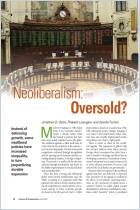
Neoliberalism’s Bailout Problem
Mainstream economics ignores the massive government interventions that “free market” capitalism requires.
Recommendation
Neoliberalism is inherently contradictory, shunning government intervention while relying on it to avert financial market collapses, say economists Robert Pollin and Gerald Epstein in this sharp critique. They cite the bailouts that only lead to more bailouts in what has become an economic doom loop, and they note that these interventions, absent regulation, fail to discipline investors. Too-big-to-fail capitalism needs revamping, the authors contend, and they offer alternatives that will give readers some intriguing food for thought.
Summary
About the Authors
Robert Pollin and Gerald Epstein are professors of economics at the University of Massachusetts, Amherst, and they are founding directors of the Political Economy Research Institute.

















Comment on this summary or Start Discussion